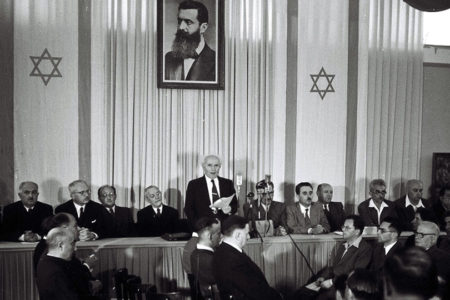Israel: Changing Faces
The face of our world is changing at an incredible rate. Armies moved through the Middle East packing a military punch never before witnessed on the face of the planet. Improbable alliances were forged between Western nations and Arab states in the interest of self-preservation in the face of a tyrant cast in the image of the world’s most vicious and inhumane characters.
In the Baltics, where the fires of freedom burned with such intensity, acts of violence and threats of repression prompt fears that the winds of liberty and spiritual freedom recently felt may as quickly die.
An old-style Vietnam War protector was asked by a newsman why he wasn’t protesting against the Gulf War. “Well,” he replied, “during the 60s, I really felt that we could change the world. But now the world is out of control. No one can change it.”
He was right—and wrong! No, we cannot change it. Bad men will continue to act as bad men, and with the dreadful instruments of destruction now available to any resourceful international butcher, confrontation and disaster are inevitable facts of life. But, yes, things will change—radically, suddenly—when the King of kings once again invades human history to establish His Kingdom and bring in the long-awaited era in which His righteousness and knowledge will cover the earth as the waters cover the sea (Isa. 11:9; Hab. 2:14). For centuries, hopeful saints have sung of a far better day when men will “study war no more.”
The rapidity with which faces change and world events alter conditions amplifies the fact that history is rushing toward a consummation. Something big must happen soon.
Nowhere is change more evident, or indicative of where things are headed, than in Israel. Witness …
Intifada: Three years ago, the “uprising” against continued occupation of the “territories” began. (It has been pointed out that the Intifada is better expressed in the phrase to throw off, reflecting the resident desire to remove Israel from the Middle East.) This continuing problem has polarized the situation to an extent never equaled since modern Israel became a state.
Immigration: Soviet Jews began to invade the country in numbers dwarfing those during the early days of the state. No single nation has ever mounted an Aliyah movement into Israel comparable to the numbers of Russian-Jewish emigrés returning to the land in recent months.
On nights when SCUD missiles slammed into Tel Aviv, the planes of El Al continued to bring in the Russian Jews. Their presence has impacted the nation in dramatic ways.
It may be a bit of an exaggeration to say that Russia’s brain has moved to Israel, but it is undeniable that, for its size, Israel possesses more technical and scientific expertise than any other country in the world.
The Russian-Jewish presence, while taxing to the limit abilities to house and employ the newcomers, has allowed employers to replace potentially militant Palestinian workers with Israelis.
The influx of hundreds of thousands of Soviet Jews could alter the entire political scene. Analysts believe that by 1992 immigrants may capture ten to fifteen parliamentary seats. If this happens, the political gridlock between the Labor and Likud parties will be broken. More importantly, the inordinate influence of the ultra-orthodox religious parties will be broken, and Israel will take on a very different look.
Many Russian Jews are much less prejudiced against believers in the Messiah than are the European survivors of World War II. In Russia, believers were a persecuted minority also and not regarded as a threat to spiritually deprived Jewry. Consequently, a significant number of immigrants seek religious truth from the entire Bible. As one expressed it, “I want the Old and the New!”
The Gulf War: The war in the Persian Gulf introduced Israelis to several firsts.
For the first time, Israel did not retaliate against aggression. The nation’s credo has been: When attacked, hit back immediately and hard. In a world that is, for Jews in general and Israelis in particular, a jungle, it has been the way of survival. Changing the pattern ran the calculated risk of being deemed weak, something Israel does not have the luxury to practice repeatedly.
For the first time, Israel allowed foreign troops to man installations in their country. In the aftermath of the SCUD attacks, a nation fiercely proud of their ability to defend themselves welcomed US servicemen with the Patriot missiles.
For the first time, Israel depended on outside forces to secure her borders. Allied troops, with their formidable air power, were trusted to deal with an enemy who had attacked her without provocation. In addition, the aircraft carrier USS Forrestal was dispatched to waters off Israel’s coast.
Global Society: Almost overnight Israel, and the world, have been struck by a new fact: the global society. Prophetic teachers have spoken fervently for years about a coming day when there would be an end-time world order. Across the centuries, this world order has been the dream of secular statesmen. But in spite of a League of Nations, or United Nations, super powers did pretty much as they pleased. In reality, nations still stood as individuals committed to their own self-interests.
But that is no longer the fact. Our president speaks of “a new world order,” and the demonstration of the force of the terminology was shown by the coalition of nations arrayed to carry out the UN resolutions against Iraq. And while the final chapter for the “new world order” has not been seen, it has already been written. We are a functional part of a new reality.
In this scheme of things, one can believe that no one will be surprised when Israel gladly accepts a Western European leader’s offer to secure her borders in order for a war-wearied people to live in “the land of unwalled villages; [and be] at rest, … dwell safely … without walls, and having neither bars nor gates” (Ezek. 38:11).
Visions of impending Armageddon rise from all of this to numb us with a chilling realization that, for Israel, her cup of “trouble” will soon be full. As much as has been said and written on the subject during these tension-filled months, there can be no comfort in the fact that we are a witness to the prelude to the final struggles. We believers have before us the glorious reality of the Blessed Hope—our Lord will call His Church to Himself before that dreadful hour. But our hearts long for the final triumph when Israel’s weeping will be turned to joy, and faces contorted with unspeakable agonies will be alight with laughter.
This chapter, too, has already been written. And, as surely as we are witnessing events leading up to the final convulsions of the last days, we will see “the day break, and the shadows flee away” (Song 4:6). Jeremiah describes it beautifully: “The Lᴏʀᴅ hath appeared of old unto me, saying, Yea, I have loved thee with an everlasting love; therefore, with loving-kindness have I drawn thee” (Jer. 31:3).
A New Condition: “At the same time, saith the Lᴏʀᴅ, will I be the God of all the families of Israel, and they shall be my people” (Jer. 31:1).
A New Covenant: “But this shall be the covenant that I will make with the house of Israel: After those days, saith the Lᴏʀᴅ, I will put my law in their inward parts, and write it in their hearts, and will be their God, and they shall be my people. And they shall teach no more every man his neighbor, and every man his brother, saying, Know the Lᴏʀᴅ; for they shall all know me, from the least of them unto the greatest of them, saith the Lᴏʀᴅ; for I will forgive their iniquity, and I will remember their sin no more” (Jer. 31:33–34).
A New Consequence: “Behold, I will gather them out of all countries, to which I have driven them in mine anger, and in my fury, and in great wrath; and I will bring them again unto this place, and I will cause them to dwell safely … Yea, I will rejoice over them in doing them good, and I will plant them in this land assuredly with my whole heart and with my whole soul. For thus saith the LORD, As I have brought all this great evil upon this people, so will I bring upon them all the good that I have promised them” (Jer. 32:37, 41–42).
A New Commander: “In those days, and at that time, will I cause the Branch of righteousness to grow up unto David; and he shall execute justice and righteousness in the land. In those days shall Judah be saved, and Jerusalem shall dwell safely; and this is the name by which she shall be called, THE LORD, OUR RIGHTEOUSNESS” (Jer. 33:15–16).
Remember the Russian immigrant I quoted who demanded both portions of the Book of Life, “the Old and the New”? He was a wise man indeed, for whether he fully understood all that he was asking or not, he articulated perfectly the immediate and ultimate way out.
Jeremiah and a host of other Old Testament passages speak of the “Branch of righteousness” who will come from the house of David. David’s Greater Son, the fulfillment of every word of promise to Israel listed above, is announced by the prophet. He is identified in the New Testament Gospels.
“For unto you is born this day in the city of David a Savior, who is Christ the Lord” (Lk. 2:11). The one born in the city of David was the Son of David spoken of by the prophet. And while the Old Testament announces the coming of the Kingdom, the New Testament proclaims the person of the King. Only those who know the King can enter the Kingdom!
So, Jeremiah’s word in chapter 33 rings with intimate urgency: “Call unto me, and I will answer thee, and show thee great and mighty things, which thou knowest not” (Jer. 33:3). Whatever state of life one finds himself in, this precious word of comfort will apply. Remembering all that has gone before, especially those who need the Redeemer and the assurance of salvation, if you will call upon Him, He will answer.
For whosoever shall call upon the name of the Lord shall be saved (Rom. 10:13).








